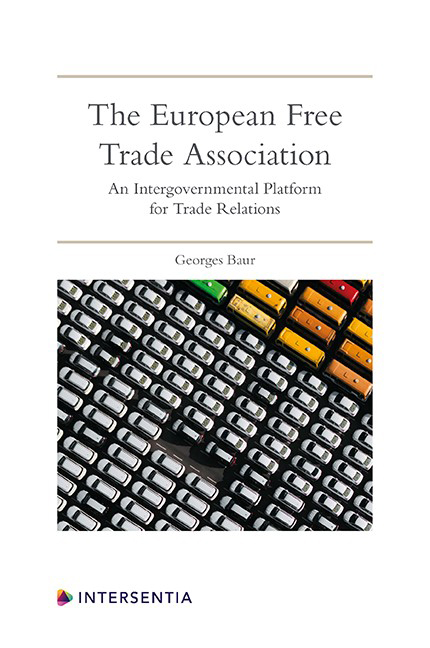Book contents
- Frontmatter
- Foreword
- Preface
- Acknowledgements
- Contents
- List of Tables and Figures
- Chapter 1 What is EFTA?
- Chapter 2 Short Historical Overview
- Chapter 3 Substantive Fields of Activity of EFTA
- Chapter 4 EFTA Institutions, Membership, Scope and Other General Provisions
- Chapter 5 Trade Relations with Third Countries and Groups of Countries
- Chapter 6 The Relations between the EFTA States and the EU/EEA
- Chapter 7 Conclusion: EFTA Membership for the UK Post-Brexit?
- Convention Establishing the European Free Trade Association
- Annex K. Free Movement of Persons (Chapter VIII)
- Annex T. Arbitration (Art. 48)
- Index
- About the Author
Chapter 5 - Trade Relations with Third Countries and Groups of Countries
Published online by Cambridge University Press: 21 July 2020
- Frontmatter
- Foreword
- Preface
- Acknowledgements
- Contents
- List of Tables and Figures
- Chapter 1 What is EFTA?
- Chapter 2 Short Historical Overview
- Chapter 3 Substantive Fields of Activity of EFTA
- Chapter 4 EFTA Institutions, Membership, Scope and Other General Provisions
- Chapter 5 Trade Relations with Third Countries and Groups of Countries
- Chapter 6 The Relations between the EFTA States and the EU/EEA
- Chapter 7 Conclusion: EFTA Membership for the UK Post-Brexit?
- Convention Establishing the European Free Trade Association
- Annex K. Free Movement of Persons (Chapter VIII)
- Annex T. Arbitration (Art. 48)
- Index
- About the Author
Summary
INTRODUCTION
HISTORICAL NOTE
Today, the EFTA states have a considerable network of free trade agreements (FTAs) and other types of agreements with different kinds of partners, i.e. countries, special administrative regions (Hong Kong, China) and groups of countries all over the world. This was, however, not part of the original (main) scope of EFTA. Originally, free trade was to be established, first, among EFTA states and, second, with the EU (originally the EEC, later EC).
Naturally, there was, also, the perspective to conclude FTAs with close neighbours that were – at the time – members of neither EFTA nor the EU. Such a case was Spain or, later, Turkey. Then, after the collapse of communism and the respective economic bloc (COMECON), FTAs were concluded with the Central and Eastern European countries. There was, already then, a certain parallel development with that of the EU which had concluded so-called ‘Europe Agreements’ with these countries to allow them to eventually join the EU.
Around the same time, in the second half of the 1990es, the EU started to negotiate FTAs at a global level. 3 In order not to lose competitiveness in comparison with the EU, EFTA started to build a similar network of FTAs.
In this context FTAs means agreements on free trade with third countries, i.e. excluding trade relations in substance between the EFTA states or with the EU.
In 2018, 29 FTAs were in place with 40 partner countries and customs territories: Albania, Bosnia and Herzegovina, Canada, the Central American states of Costa Rica and Panama (entry into force pending for Guatemala), Chile, Colombia, Ecuador (entry into force pending), Egypt, Georgia, the Gulf Cooperation Council (GCC, comprising Bahrain, Kuwait, Oman, Qatar, Saudi Arabia and the United Arab Emirates), Hong Kong China, Indonesia (entry into force pending), Israel, Jordan, the Republic of Korea, Lebanon, North Macedonia, Mexico, Montenegro, Morocco, Palestinian Authority, Peru, the Philippines, Serbia, Singapore, the Southern African Customs Union (SACU, comprising Botswana, Lesotho, Namibia, South Africa and Eswatini), Tunisia, Turkey and Ukraine.
LEGAL BASIS AND INTERNATIONAL LAW (WTO) CONTEXT
The legal basis for EFTA's third-country relations can be found in Article 56(2) of the (revised) EFTA Convention.
- Type
- Chapter
- Information
- The European Free Trade AssociationAn Intergovernmental Platform for Trade Relations, pp. 85 - 114Publisher: IntersentiaPrint publication year: 2020

